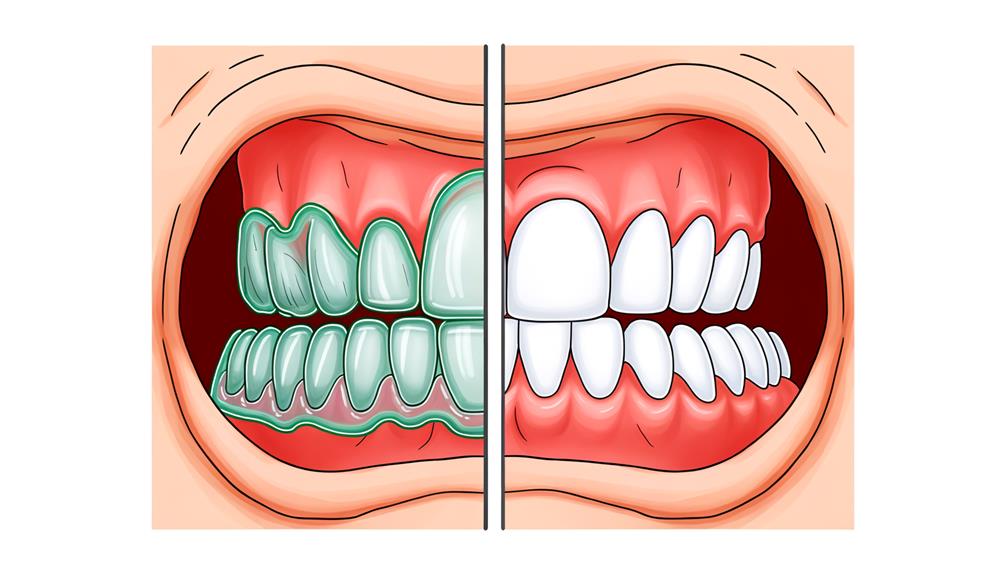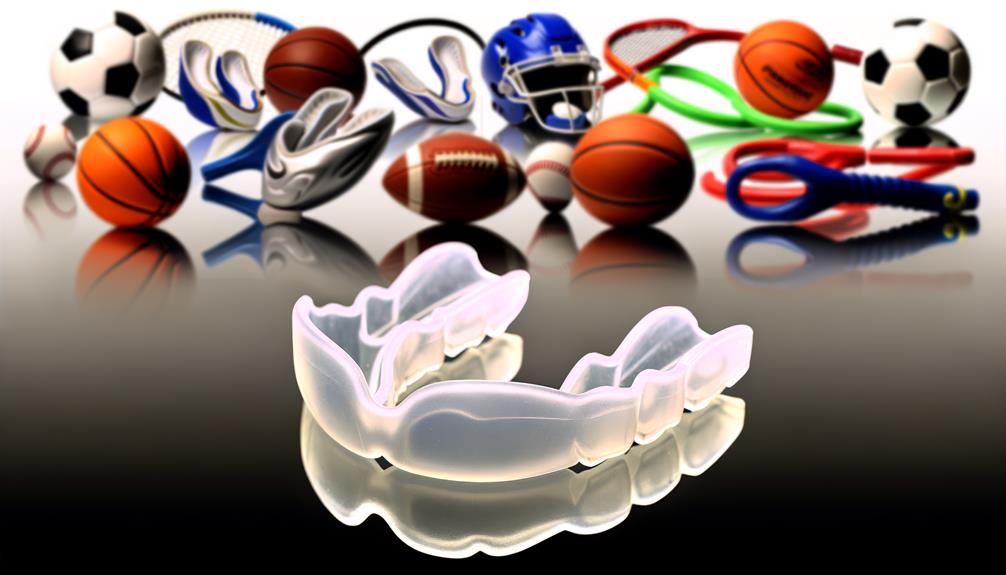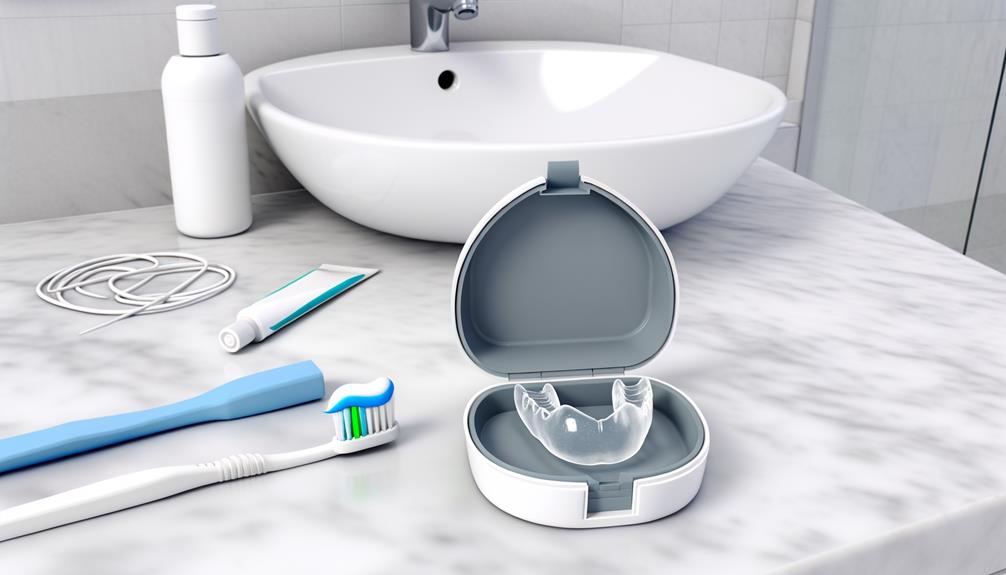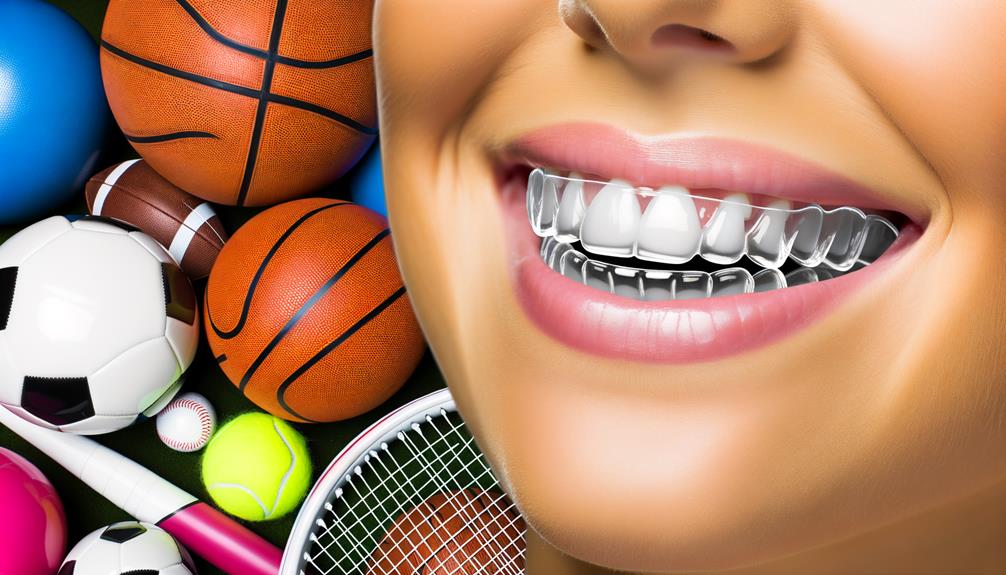Ever wondered what stands between you and a costly, painful dental injury during your favorite sports activities? It’s a simple yet effective device: a mouthguard.
While you may think it’s just an optional accessory, the truth is, that a mouthguard plays an essential role in protecting your teeth from impact, preventing dental injuries, and even reducing the risk of concussions.
Don’t be fooled by its simplicity, the importance of a mouthguard extends beyond sports and into day-to-day activities, such as safeguarding your teeth from grinding or clenching during sleep.
So, let’s explore why this small piece of equipment is a giant leap toward dental health and how it can safeguard your teeth.
Key Takeaways
- Mouthguards are essential for maintaining dental health and protecting teeth from impact during sports or high-impact activities.
- They also help prevent soft tissue injuries to the lips and cheeks and can minimize the severity of concussions and head injuries.
- Custom-fitted mouthguards offer the best protection and comfort, while boil-and-bite and stock mouthguards are more affordable options.
- Proper care and regular check-ups with dental professionals are necessary to ensure that mouthguards continue to fit properly and provide adequate protection.
Daily Risks to Dental Health
While you mightn’t realize it, several daily habits and activities can pose serious risks to your dental health. Sugary and acidic foods, for instance, can lead to tooth decay and erosion. If you regularly consume these, you’re unknowingly inviting dental troubles.
Poor oral hygiene is another risk. If you’re not brushing and flossing regularly, plaque builds up, increasing chances of gum disease. By simply improving your oral hygiene habits, you can protect your teeth and overall dental health.
Tobacco use doesn’t just result in bad breath and stained teeth. It significantly increases your risk of oral cancer. The best way to mitigate this risk? Quit using tobacco products.
Neglecting regular dental check-ups is a surefire way to invite undetected dental issues. Regular visits to your dentist ensure early detection and treatment of potential problems.
Lastly, grinding or clenching your teeth, especially during sleep, can damage your teeth and cause jaw pain. Here’s where a mouthguard comes into play. It helps protect your teeth from damage caused by grinding and clenching. So, consider using a mouthguard to mitigate these daily risks to your dental health.
Choosing the Right Mouthguard
Choosing the right mouthguard is a critical step in protecting your teeth, and it’s easier than you might think. The importance of mouthguards in dental health cannot be overstated. They prevent dental injuries, making them an essential tool for anyone involved in sports or activities that could pose a risk to their teeth.
You have options when choosing the right mouthguard. Custom-made mouthguards offer the best fit and comfort. Although they may be costlier, the investment is worth considering the level of protection they provide.
| Type of Mouthguard |
Advantages |
|---|
| Custom Made |
Superior fit, comfort |
| Boil-and-Bite |
Better fit, affordable |
| Stock |
Cheapest, readily available |
Boil-and-bite mouthguards, which you can find at sporting goods stores, offer a decent fit at a lower price. Stock mouthguards are the least expensive but may not offer the best fit. Remember, a mouthguard’s effectiveness is largely dependent on its fit.
Custom Vs. Boil-And-Bite Guards

When it comes to protecting your pearly whites, the battle often boils down to custom-made versus boil-and-bite mouthguards. Both play a crucial role in the importance of mouthguards in dental health, but which one is right for you?
Custom mouthguards, molded by dental professionals, provide an unparalleled fit. They’re crafted to match your teeth and jaw precisely, providing the highest level of comfort and protection. However, they do come with a higher price tag. The American Dental Association recommends custom guards for individuals who participate in high-impact sports or have specific dental concerns.
On the other hand, boil-and-bite guards offer a more affordable alternative. They’re easy to find in most stores and can be molded at home by boiling in water and then biting into the softened material. While not as precise as a custom fit, they provide decent protection. Some brands, like CustMbite MVP and CustMbite Pro, have even earned the ADA Seal of Acceptance.
When to Wear Mouthguards
Now that you’ve got a handle on the difference between custom-fit and boil-and-bite mouthguards, let’s explore the various situations where you should be sporting one to protect your teeth. The importance of when to wear mouthguards cannot be overstated, as dental injuries can occur in a variety of scenarios, not just during sporting events.
| Activity |
When to Wear Mouthguards |
|---|
| Contact Sports |
Both during games and practice sessions. |
| High-Impact Activities |
Anytime you’re engaged in activities like skateboarding or martial arts. |
| Recreational Activities |
Whenever there’s a risk of falls or collisions, such as biking or rollerblading. |
As you can see, mouthguards should be a staple in your gear, whether you’re a professional athlete or a weekend warrior. Remember, dental health isn’t just about brushing and flossing; it’s also about protecting your teeth from potential harm. So, regardless of the activity, if there’s a chance of contact with hard surfaces or other players, it’s time to gear up and wear your mouthguard. It’s always better to be safe than sorry when it comes to your smile!
Sport-Specific Mouthguard Features
Whether you’re a football player tackling opponents or a boxer dodging punches, your sport-specific mouthguard is tailored to provide the ultimate protection for your unique athletic needs. It’s designed with additional cushioning where you need it most, like the front teeth for football players or the lips for boxers.
Crafted with advanced materials such as impact-absorbing polymers or high-strength composites, your mouthguard offers superior protection from potential injuries. It’s more than just sports equipment, it’s your safeguard against costly dental treatments and a key to maintaining your oral health.
The design considers specific movements and motions of your sport. This ensures a secure, comfortable fit during athletic activities, allowing you to focus on your game, without worrying about dental injuries.
Molding Your Boil-and-Bite Guard
Transforming your new boil-and-bite guard into a custom-fitted dental shield is a straightforward process, but don’t skimp on the details. Molding your boil-and-bite guard is crucial to ensure it fits snugly, providing optimal protection to safeguard your precious teeth and soft tissues from potential injuries.
Start by boiling your guard in water, following the manufacturer’s instructions to the letter. This softens the material, preparing it for the next crucial step: molding it to your unique dental profile.
Once boiled, carefully place the guard over your teeth, biting down to create a custom impression. Hold this position for a few moments, allowing your guard to set into shape.
Caring for Your Mouthguard
Taking proper care of your mouthguard is essential to ensure it continues to provide optimal dental protection and lasts for a long time. A crucial aspect of mouthguard care is cleanliness. Make it a habit to rinse your mouthguard with cold water before and after each use. Additionally, you should brush your mouthguard regularly using toothpaste and a toothbrush. This simple routine can keep your mouthguard clean and free from bacteria.
Storing your mouthguard properly is also key. Use a well-ventilated case for storage to prevent bacterial growth. This prevents unpleasant odors and extends the life of your mouthguard. Be careful to avoid exposing your mouthguard to high temperatures or direct sunlight, as these can cause it to deform and lose its protective qualities.
Frequently Asked Questions
Why Are Mouthguards Important?
Mouthguards protect your teeth from impact, reducing dental injury risks. They’re essential for sports, help prevent soft tissue injuries, and can lessen concussion severity. They’re a vital tool for preserving your dental health.
How Does a Mouthguard Affect Oral Health?
A mouthguard significantly boosts your oral health. It shields teeth from injuries, mitigates damage from grinding, and prevents soft tissue injuries. Proper use can save you from costly dental repairs. It’s a smart, protective measure.
What Is the Primary Purpose For Wearing a Mouth Guard?
The primary purpose of wearing a mouthguard is to protect your teeth and gums during physical activities. It significantly reduces the risk of dental injuries, ensuring a healthy, intact smile even in high-impact situations.
What Happens If You Don’t Wear a Mouthguard?
If you don’t wear a mouthguard, you’re risking dental injuries, especially during athletic activities. Broken or damaged teeth can occur, as well as mouth injuries. Even non-contact activities can harm unprotected teeth. Don’t risk it, protect your smile.
How Do Mouthguards Help in Maintaining Dental Health?
Wearing cuttingedge sports mouth guards can protect your teeth from injury during sports activities. They provide a cushion to absorb impact and reduce the risk of chipping, cracking, or knocking out teeth. Additionally, they can help reduce the risk of jaw fractures and soft tissue injuries in the mouth.
Conclusion
Don’t let your smile be the ‘Achilles heel’ of your game. Make mouthguards your go-to protection against serious, life-changing dental injuries.
They are not just a necessity for athletes but a shield for anyone prone to nighttime grinding. Choose wisely, mold it properly, and care for it like a prized possession.
Remember, your smile is your greatest asset. So, gear up, protect your teeth with a mouthguard, and let your vibrant, healthy smile be your winning streak.




